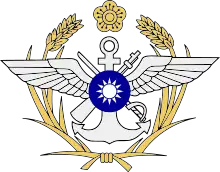Republic of China Navy
The Republic of China Navy (ROCN; Chinese: 中華民國海軍; pinyin: Zhōnghuá Mínguó Hǎijūn), also known as the Taiwan Navy[1] is the maritime branch of the Republic of China Armed Forces. The ROC Navy's primary mission is to defend ROC territories and the sea lanes that surround Taiwan against a blockade, attack, or possible invasion by the People's Liberation Army Navy of the People's Republic of China. Operations include maritime patrols in the Taiwan Strait and surrounding waters, as well as counter-strike and counter-invasion operations during wartime. The Republic of China Marine Corps functions as a branch of the Navy.
| Republic of China Navy | |
|---|---|
| 中華民國海軍 Zhōnghuá Mínguó Hǎijūn (Mandarin) Chûng-fà Mìn-koet Hói-kiûn (Hakka) | |
_Logo.svg.png.webp) Emblem of the ROCN | |
| Founded | 1924 |
| Country | |
| Type | Navy |
| Size | 38,000 personnel 117 Ships 28 Aircraft |
| Part of | Republic of China Armed Forces |
| Colors | white |
| March | "The New Navy" (新海軍). |
| Fleet | 4 Destroyer 20 Frigate 31 Missile boat 4 Submarine 1 Corvette 12 Patrol ship 9 Minesweeper 10 Landing Ship, Tank (10 Auxiliaries) |
| Website | navy.mnd.gov.tw/en/ (in English) |
| Commanders | |
| Commander of the Navy | |
| Deputy Commanding-General | |
| HQs' Chief of Staff | |
| Insignia | |
| Ensign | 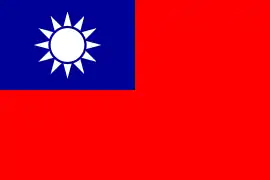 |
| Jack | 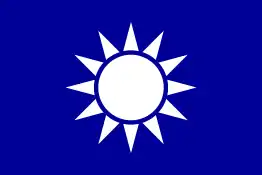 |
| Republic of China Navy | |||||||||||||||||
|---|---|---|---|---|---|---|---|---|---|---|---|---|---|---|---|---|---|
| Traditional Chinese | 中華民國海軍 | ||||||||||||||||
| Simplified Chinese | 中华民国海军 | ||||||||||||||||
| |||||||||||||||||
The ship prefix for ROCN combatants is ROCS (Republic of China Ship); an older usage is CNS (Chinese Navy Ship).
Organization
Republic of China Navy Command Headquarters
_Admiral_Liu_Chih-pin_%E6%B5%B7%E8%BB%8D%E4%B8%8A%E5%B0%87%E5%8A%89%E5%BF%97%E6%96%8C_(20200116_%E6%B5%B7%E8%BB%8D%E5%8F%B8%E4%BB%A4).png.webp)
_Voice_of_America_Image_94C3D401-1AE5-42D1-B4FE-F3F0ACCFCFCB_w650_r0_s_%E7%BE%8E%E5%9C%8B%E4%B9%8B%E9%9F%B3%E5%9C%96%E7%89%87_%E5%8F%B0%E7%81%A3%E5%9C%8B%E9%98%B2%E9%83%A8%E6%A2%85%E5%AE%B6%E6%A8%B9%E5%B0%91%E5%B0%87.jpg.webp)
_Vice_Admiral_Tang_Hua_%E6%B5%B7%E8%BB%8D%E4%B8%AD%E5%B0%87%E5%94%90%E8%8F%AF_(06.27_%E3%80%8C%E4%B8%AD%E8%8F%AF%E6%B0%91%E5%9C%8B106%E5%B9%B4%E4%B8%8B%E5%8D%8A%E5%B9%B4%E9%99%B8%E6%B5%B7%E7%A9%BA%E8%BB%8D%E5%B0%87%E5%AE%98%E6%99%89%E4%BB%BB%E5%B8%83%E9%81%94%E6%9A%A8%E6%8E%88%E9%9A%8E%E5%85%B8%E7%A6%AE%E3%80%8D_35174159590_be2028dccd_o).jpg.webp)
The Navy CHQs (中華民國國防部海軍司令部) is subordinate to the General Staff, the Minister of Defense, and the ROC President.
- Internal units: Personnel, Combat Readiness & Training, Logistics, Planning, Combat Systems, General Affairs, Comptroller, Inspector General, Political Warfare.
- Naval Fleets Command (艦隊指揮部)
- 124th Fleet: Zuoying District, Kaohsiung City
- 131st Fleet: Keelung City, Taiwan
- 146th Fleet: Magong City, Penghu County, Taiwan
- Amphibious Fleet (151st Fleet), Zuoying District, Kaohsiung City
- 168th Fleet: Suao, Yilan County, Taiwan
- 192nd Fleet (Navy Minesweeper Fleet): Zuoying District, Kaohsiung City
- 256th Submarine Squadron: Zuoying District, Kaohsiung City
- 261st Squadron
- Hai Chiao(Sea Dragon) PGMG Guided Missile Boat/Craft Group (海蛟大隊)
- 1st Hai Chiao Guided Missile Boat/Craft Squadron of 10 Kuang Hua VI-class missile boat at Suao naval base
- 2nd Hai Chiao Guided Missile Boat/Craft Squadron of 10 Kuang Hua VI-class missile boat
- 3rd Hai Chiao Guided Missile Boat/Craft Squadron of 10 Hai Ou-class missile boat (Dvora class)
- 4th Hai Chiao Guided Missile Boat/Craft Squadron of 10 Hai Ou-class missile boat (Dvora class)
- 5th Hai Chiao Guided Missile Boat/Craft Squadron of 11 Kuang Hua VI-class missile boat[2][3]
- Hai Feng Shore Based Anti-ship Missile Group (海鋒大隊), operates 6 batteries of fixed/mobile HF-2 anti-ship missiles.
- Aviation Command (operates from Pingtung, Tsoying, and Hualien AB)
- Naval Aviation, at Pingtung, will receive 12 P-3C 2013/2014.
- 1st ASW Aviation Group
- 133rd Squadron: S-2T, at Pingtung.
- 134th Squadron: S-2T, at Pingtung.
- 2nd ASW Aviation Group
- 701st Helicopter Squadron (Light), S-70C(M)-1, at Hualien.
- 702nd Helicopter Squadron (Light), S-70C(M)-2, at Tsoying.
- 501st Helicopter Squadron (Light), 500MD ASW, at Tsoying.
- Maintenance Group
- 1st Maintenance Squadron (Pingtung)
- 2nd Maintenance Squadron (Tsoying)
- 3rd Maintenance Squadron (Hualien)
- Marine Corps Command (陸戰隊指揮部)
- Education, Training and Doctrine Command (教育訓練暨準則發展司令部)
- Logistics Command (後勤司令部)
- Naval Academy, Hydrographic & Oceanographic Bureau, Shipbuilding Development Center, Communication Systems, General Service.
History
| ROC (Taiwan) Navy |
|---|
 |
| Leadership |
|
Ministry of Defense Commander of the Navy |
| Commands |
| Republic of China Marine Corps |
| Equipment |
| Ships |
| Personnel |
| Rank insignia |
| Orders, Decorations and Medals |
|
List of orders, decorations and medals Order of Blue Sky and White Sun |
| History and Traditions |
| Naval history of China |
1912–1949

The precursor to the modern ROC Navy was established as the Ministry of the Navy in the Provisional Government of the Republic of China in 1911 following the overthrow of the Qing dynasty. Liu Guanxiong, a former Qing dynasty admiral, became the first Minister of Navy of the Republic of China. During the period of warlordism that scarred China in the 1920s and 1930s the ROCN remained loyal to the Kuomintang government of Sun Yat-sen instead of the warlord government in Beijing which fell to the nationalist government in the 1928 northern campaign and between the civil war with the Communist Party and 1937 Japanese invasion of Northeast China. During that time and throughout World War II, the ROCN concentrated mainly on riverine warfare as the poorly equipped ROCN was not a match to Imperial Japanese Navy over ocean or coast.[10]
Following World War II, a number of Japanese destroyers and decommissioned U.S. ships were transferred to the ROC Navy. During the Chinese Civil War, the ROCN was involved in the protection of supply convoys and the withdrawal of the ROC Government and over 1 million refugees to Taiwan in 1949. The subsequent reorganization and reestablishment of the Navy after evacuation to Taiwan is referenced in the lyrics of the post 1949 ROC Navy Song "The New Navy" (新海軍).
1949–present
Following the relocation of the ROC government to Taiwan, the ROCN was involved in a number of commando attack escorts, evacuation and transport of more displaced soldiers and later to provide patrols and resupply operations to Kinmen and Matsu in the Taiwan Strait and South China Sea offshore islands.
Since the 1990s the Navy has grown in importance as the emphasis of the ROC's military doctrine moves towards countering a possible People's Republic of China (PRC) blockade, as well as offshore engagement. As of 2004 the ROCN had been working hard to expand its capability in electronic and anti-submarine warfare, as well as the replacement of antiquated warships and support vessels.[8] While for many years the ROCN operated hand me down and foreign designed vessels in recent years they have been operating a higher number of indigenous platforms, sensors, and weapons much of it made by the National Chung-Shan Institute of Science and Technology.[11]
In 2018 Lungteh Shipbuilding was awarded a contract to produce eleven Tuo Chiang Block II corvettes and four minelayers for the Taiwanese Navy.[12]
In April 2020 in response to the COVID-19 pandemic the ROCN cut short their semi-annual goodwill mission to Central and South America. The flotilla consisting of two frigates and a supply vessel was subject to 30 days of quarantine after returning to Taiwan.[13]
In April 2020 Taiwanese boatbuilder Karmin International Co., Ltd. won a NT$450-million (US$14.9-million) contract to supply the Republic of China Navy with eighteen special operations watercraft and eight RIB tenders, the later for the Cheng Kung-class frigates. Delivery is scheduled for June 2022. The contract covered only the watercraft themselves with their machine guns, infrared equipment, and boarding ladders sourced separately.[14]
Rank and rating insignia
- Officers
| Equivalent NATO code | OF-10 | OF-9 | OF-8 | OF-7 | OF-6 | OF-5 | OF-4 | OF-3 | OF-2 | OF-1 | OF(D) and student officer | |||||||||||||||||||||||||
|---|---|---|---|---|---|---|---|---|---|---|---|---|---|---|---|---|---|---|---|---|---|---|---|---|---|---|---|---|---|---|---|---|---|---|---|---|
| No equivalent | 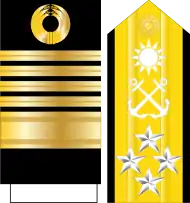 |
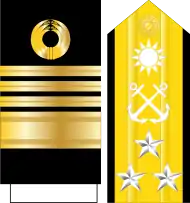 |
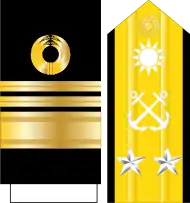 |
 |
No equivalent | 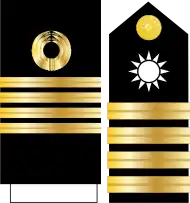 |
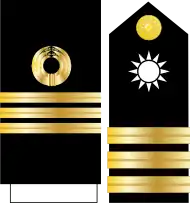 |
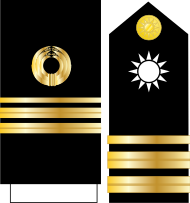 |
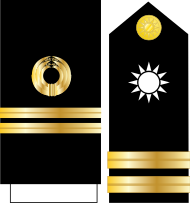 |
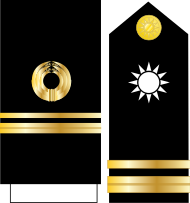 |
 |
|||||||||||||||||||||||||
| Full Admiral 一級上將 |
Admiral 二級上將 |
Vice admiral 中將 |
Rear admiral 少將 |
Captain 上校 |
Commander 中校 |
Lieutenant commander 少校 |
Lieutenant 上尉 |
Lieutenant (junior grade) 中尉 |
Ensign 少尉 |
Officer cadet 軍校生 | ||||||||||||||||||||||||||
| Pinyin | Yījí Shàngjiàng | Èrjí Shàngjiàng | Zhōngjiàng | Shaojiàng | Daijiàng | Shàngxiào | Zhōngxiào | Shàoxiào | Shàngwèi | Zhōngwèi | Shàowèi | Jūnxiào shēng | ||||||||||||||||||||||||
- Non-commissioned
| Equivalent NATO code | OR-9 | OR-8 | OR-7 | OR-6 | OR-5 | OR-4 | OR-3 | OR-2 | OR-1 | |||||||||||||||||||||||||||||
|---|---|---|---|---|---|---|---|---|---|---|---|---|---|---|---|---|---|---|---|---|---|---|---|---|---|---|---|---|---|---|---|---|---|---|---|---|---|---|
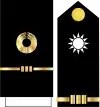 |
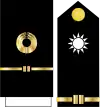 |
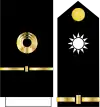 |
 |
 |
 |
 |
 |
 | ||||||||||||||||||||||||||||||
| Command master chief petty officer 一等士官長 |
Master chief petty officer 二等士官 |
Senior chief petty officer 三等士官長 |
Chief Petty Officer 上士 |
Petty Officer 1st Class 中士 |
Petty Officer 2nd Class 下士 |
Seaman 上等兵 |
Seaman apprentice 一等兵 |
Seaman recruit 二等兵 | ||||||||||||||||||||||||||||||
| Pinyin | Yīděng Shìguān zhǎng | Èrděng Shìguān zhǎng | Sānděng Shìguān zhǎng | Shàngshi | Zhōngshi | Xiàshi | Shàngděng Bīng | Yīděng Bīng | Èrděng Bīng | |||||||||||||||||||||||||||||
Equipment
Traditionally, most ROCN equipment is purchased from the United States, though several ships have been built domestically under licence or through domestic development. The ROCN has also purchased La Fayette-class frigates from France and Zwaardvis-class submarines from the Netherlands as well as four U.S. Kidd-class (renamed Keelung) destroyers originally intended for Iran.
Despite the ROCN refurbishing and extending the service life of its vessels and equipment, it has suffered from procurement difficulties due to pressures exerted by the PRC. It has only two useful submarines. The U.S. has approved sales of eight new diesel-powered submarines but lacks the manufacturing capability to make the engines; at the same time, threats from the PRC prevent the necessary technology transfer from other countries. Furthermore, the Legislative Yuan did not approve the budget and thereby slowed the opportunity to procure the badly needed underwater defense capability.
On 12 September 2007, an arms notification was sent to the United States Congress concerning an order for 12 P-3C Orion patrol aircraft and 3 "spare aircraft", along with an order for 144 SM-2 Block IIIA surface-to-air missiles.[15] A contract was awarded to Lockheed Martin to refurbish the 12 P-3C Orion aircraft for the ROC on 13 March 2009, with deliveries to start in 2012.[16]
In 2008, the ROCN set out to acquire an improved anti-ship capability. On 26 August, an arms notification was sent to Congress for an order for 60 air-launched Harpoon Block II missiles for the 12 P-3Cs.[17] At least a portion of these missiles will be installed on the navy's Hai Lung-class submarines.
On 29 January 2010, the U.S. government announced five notifications to the U.S. Congress for arms sales to the ROC. In the contracts total US$6.392 billion, ROC Navy would get 2 Osprey-class minehunters for US$105 million, 25 Link 16 terminals on ships for US$340 million, 10 ship- and 2 air-launched Harpoon L/II for US$37 million.[18][19]
The ROC Navy already has 95 older Harpoon missiles in its inventory for the 8 Knox-class frigates, 22 newer RGM-84L for the 4 Kidd-class destroyers, 32 sub-launched Harpoon II on order for the 2 Hai Lung-class submarines, and with 60 air-launched Harpoon Block II anti-ship missile on order for the 12 P-3Cs, plus the newly announced 10 ship-launched and 2 air-launched Harpoon II/L sales.[20]
On 31 August 2010, it was announced for the next year's defense budget, ROCN planned to lease one or two more Newport-class tank landing ships (LST) from the United States, but the 900-ton stealth corvette plan was put on hold, due to lack of funds.[21] That same year, On 29 September, the U.S. Congress passed a resolution, authorizing the U.S. Government for the sale of one more Osprey-class minehunter to the ROC.[22]
Other ongoing local upgrade programs include locally designed and built Ching Chiang class of 12 patrol ships that were designed back in the 1990s to carry four HF-1 anti-ship missiles on board but only the lead ship of the class had them. Since 2006, seven ships of this class were upgraded to carry four HF-2/3 with W-160 fire control radar from Wu Chin III program (as well as Honeywell H-930 MCS CDS stripped from seven retired Yang-class Wu Chin 3 anti-air warfare destroyers). In 2010 more ships of this class were undergoing this same upgrade program but using CSIST produced fire control radars instead. Currently four different variants exist within this class, the original Ching Chiang patrol ship constructed with four HF-1 (one existing in this configuration).
On 29 December 2010, two LSTs (中肇、中治戰車登陸艦) and four remaining of Adjutant-class coastal minehunters were retired.[23]
In 2011, the navy retired several vessels. On 31 October, all eight PCL in the 124th Fleet were retired.[24] On 28 December, the two Lung Jiang-class (PSMM Mk5) guided missile patrol boats (PGG 601 and PPG 602) of the 131st Fleet were retired from ROC Navy service, after entering service in 1978 and 1981 respectively.[25]
_leaving_Mayport_in_January_2014.JPG.webp)
In June 2018, two Oliver Hazard Perry-class frigates of the US Navy, ex-USS Taylor and ex-USS Gary, were handed over to the Government of Taiwan for the Republic of China Navy. The transfer cost was an estimated US$177 million. The transfer of the ships includes the advanced AN/SQR-19 Multi-Function Towed array sonar. Taiwan had previously been blocked from acquiring the AN/SQR-19, and the transfer of the system points to an anti-submarine focus in line with the Knox-class frigates they will likely replace.[26]
Indigenous ‘Landing Platform Dock’ / Amphibious Assault Ship
In September 2018, Taiwan confirms contract for first amphibious assault ship built in Taiwan. It will be built by CSBC Corporation, a local shipyard. Four are planned with the first to be entering service around 2021. It is roughly similar to US Navy's San Antonio class, but with a slightly smaller displacement. Support features include a full hospital, well deck, full aviation facilities, storage for wheeled vehicles, and dedicated accommodations for a full battalion of Marines.[27] The vessel design will be armed with a 76 mm naval gun in the primary position, a close-in weapon system (CIWS) turret, two 12.7 mm machine gun positions in the forward section, and launchers that can deploy the Hsiung Feng II and III family of anti-ship and land-attack cruise missiles.[28][29][30] The primary sensor is expected to be a naval version of the indigenous CS/MPQ-90 Bee Eye AESA radar.[31]
Fleet Air Defense Upgrade / Hsun Lien Project
The ROC Navy currently lacks a modern fleet defense system. Its destroyers currently use obsolete Mark 26 missile launchers designed from the 1970s and does not currently have a modern centralized air defense combat system like the Aegis.[32][33] Past US administrations rejected the sale of Aegis radar system and Arleigh Burke-class destroyers, including George W. Bush in 2001. Under George W. Bush administration, the US instead sold Taiwan four Kidd-class destroyers, which did not carry the Aegis and were no longer in service in the US Navy at the time.[34][35][36] However, in January 2019, the US government delivered two sets of Mk 41 VLS to Taiwan. The ROC government plans to integrate the MK41 VLS and locally developed Tien-Kung III (Sky Bow III) with its indigenously developed Hsun Lien naval combat system, which is similar to Aegis, to upgrade its ship air defense capabilities.[37][38] Taiwan has acquired the license and technology to produce additional MK 41 VLS launchers. The ROC Navy currently as of 2019 possesses at least 14 warships compatible with the Mk41.[39] Additionally, the AN/SLQ-32 system on the Kee Lung class guided missile destroyers (formerly Kidd-Class Destroyers) will be upgraded and is expected to be completed by 2023.[40] In November 2019 it was reported that the decommissioned amphibious landing ship Kao Hsiung (LCC-1) was being used as a test ship for the Hsun Lien naval combat system project and had been fitted with a large phased array radar system and the Mark 41 Vertical Launching System.[41] In January 2020, it is reported the Tien-Kung III (Sky Bow III) is successfully fired from the Mark 41 Vertical Launching System.[42][43]
Indigenous Defense Submarine (IDS) Program
With its two effective submarines being of Dutch design manufactured in the late 1980s, Taiwan has been trying to acquire more modern submarines for over 20-years; but the US only makes large nuclear submarines, and other sellers of conventional submarines have been scarce. In 2003 the US Government brokered an offer and suggested buying four (even older and smaller) Nazario Sauro-class submarines from Italy (which the Italians would completely refurbish). Italy reportedly also agreed to sell them an additional four other later vintage Sauro-class submarines still on active duty with the Italian Navy, for a total of eight, following their eventual decommissioning by the Italian Navy. However, Taipei rejected this offer, saying it wanted new submarines. In subsequent years no other solution was found.
Whilst Taiwan was actively seeking to purchase diesel-electric submarines from other nations, it started considering the possibility of building the required eight submarines indigenously, after repeated failures to strike an overseas deal. A squadron of modern submarines would greatly improve the Navy's defensive capabilities. However building submarines is a very daunting technological project. On 15 April 2014, the Defence Minister Yen Ming announced that the United States agreed to help Taiwan to construct its own diesel-electric attack submarines (SSKs).[44]
In April 2018, President of the United States Donald Trump approved the license necessary for American firms to sell Taiwan the technology needed to build its own submarines.[45] In July 2018, it was reported[46] that a company from India and a defense contractor from Japan had submitted design proposals for the Indigenous Defense Submarine program[47] alongside two companies from America and another two from Europe.[48][49]
In May 2019, Taiwan revealed a scale model of its chosen design for an indigenous built diesel-electric attack submarine. The external design appears to be similar to Japan's Soryu– and Oyashio-class SSKs and includes an X-form rudder similar to one found on Sōryū-class submarine.[50] The boats will be assembled using Japanese construction techniques in Taiwan. A Japanese team consisting of 'retired' engineers from Mitsubishi and Kawasaki Heavy Industries will provide technical support. Reportedly, a version of the AN/BYG-1 submarine combat management system, used in US Navy nuclear submarines, is being offered to Taiwan (as no other foreign manufacturer's systems are available).[51][52] The vessels are projected to be in the 2,500-ton class and 70m in length.[53]
In October 2019 it was reported that construction of the class would commence at the Heping Island yard in Keelung rather than in Kaohsiung.[54] Later in October 2019 it was reported that personnel working on the project were forbidden from traveling to or transiting through Macao or Hong Kong (their travel to Mainland China had already been restricted) due to security concerns.[53]
In November 2020, President Tsai Ing-wen opened the submarine construction facility in Kaohsiung with plans to build eight submarines. Construction was to begin with a prototype boat which was to be built over 78 months. Anticipated delivery was in 2025, though a 78-month build time suggested a somewhat later delivery.[55][56]
Offshore Patrol Vessel (OPV) Flight II Tuo Chiang Class Corvette Program
In May 2019, the Republic of China Ministry of National Defense (MND) announced it had begun construction of three Flight-II Tuo Chiang class corvettes (also known as Tuo Jiang class). The ships will be built by Lung Teh Shipbuilding. The Tuo Chiang-class corvette is a class of stealthy multi-mission catamarans based on the single Tuo Chiang class Flight I prototype launched in 2014. They have a length of 65 meters and a displacement of 680 tonnes versus 560 tons for the existing Flight I. Their top speed remains around 45 knots. It features improved upper structure design with fewer extrusions to reduce radar signature, pre-cooled engine exhaust to reduce infrared signature, and a reduced visual signature. It can be armed with up to twelve subsonic Hsiung Feng II or supersonic Hsiung Feng III anti-ship missiles of which can be mixed configuration, a Phalanx Close-In Weapons System which may be replaced by Sea Oryx in the future, and a 76-mm main gun. In air defense configuration, it will contain a four-cell vertical launch system array. Each cell is quad-packed with four Tien Chien IIN, or Sky Sword IIN, medium-range surface-to-air missiles, for a total of 16 missiles.[57][58][59]
Destroyers (4 in service)
| Class | Picture | Type | Ships | Displacement[lower-alpha 1] | Note |
|---|---|---|---|---|---|
| Kee Lung class | _and_Ma_Kong_(DDG-1805)_shipped_in_Zhongzheng_Naval_Base_20130504b.jpg.webp) |
ROCS Tso Ying (DDG-1803) ROCS Su Ao (DDG-1802) ROCS Kee Lung (DDG-1801) ROCS Ma Kong (DDG-1805) |
9,783 tonnes | Formerly Kidd-class destroyer in US Service. Originally built for the Imperial Iranian Navy. | |
Frigates (22 in service)
| Class | Picture | Type | Ships | Displacement[lower-alpha 1] | Note |
|---|---|---|---|---|---|
| Cheng Kung class | 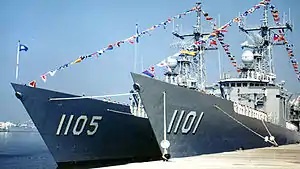 |
ROCS Cheng Kung (PFG2-1101) ROCS Cheng Ho (PFG2-1103) ROCS Chi Kuang (PFG2-1105) ROCS Yueh Fei (PFG2-1106) ROCS Tzu I (PFG2-1107) ROCS Pan Chao (PFG2-1108) ROCS Chang Chien (PFG2-1109) ROCS Tian Dan (PFG2-1110) ROCS Ming Chuan (PFG-1112) ROCS Feng Jia (PFG-1115) |
4,105 tonnes | Eight licensed ships based on US Oliver Hazard Perry class built. Two Additional ex US Navy ships purchased[60][61][62] | |
| Kang Ding class | 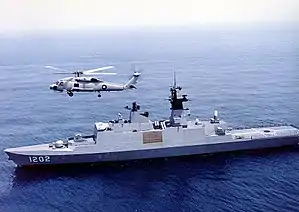 |
ROCS Kang Ding (FFG-1202) ROCS Si Ning (FFG-1203) ROCS Wu Chang (FFG-1205) ROCS Di Hua (FFG-1206) ROCS Kun Ming (FFG-1207) ROCS Chen De (FFG-1208) |
3,600 tonnes | French-built La Fayette class | |
| Chi Yang class | 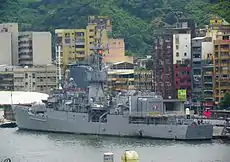 |
ROCS Fong Yang (FFG-933) ROCS Fen Yang (FFG-934) ROCS Lan Yang (FFG-935) ROCS Hwai Yang (FFG-937) ROCS Ning Yang (FFG-938) ROCS Yi Yang (FFG-939) |
4,260 tonnes | Ex-Knox class |
Fast attack missile crafts (31 in service)
| Class | Picture | Type | Ships | Displacement[lower-alpha 1] | Note |
|---|---|---|---|---|---|
| Kuang Hua VI class | 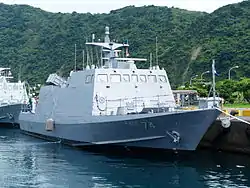 |
missile boat |
FACG-60~66 FACG-68~75 FACG-77~84 FACG-86~93 |
186.5 tonnes | Delivery began 2003 |
Patrol ships (12 in service) & corvette (1 in service)
| Class | Picture | Type | Ships | Displacement[lower-alpha 1] | Note |
|---|---|---|---|---|---|
| Ching Chiang class | 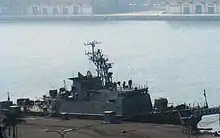 |
ROCS Ching Chiang (PG-603) ROCS Dan Chiang (PG-605) ROCS Sing Chiang (PG-606) ROCS Feng Chiang (PG-607) ROCS Tzeng Chiang (PG-608) ROCS Kao Chiang (PG-609) ROCS Jin Chiang (PG-610) ROCS Hsiang Chiang (PG-611) ROCS Tze Chiang (PG-612) ROCS Po Chiang (PG-614) ROCS Chang Chiang (PG-615) ROCS Chu Chiang (PG-617) |
500 tonnes | Delivery began 1999-2000 | |
| Tuo Chiang class | 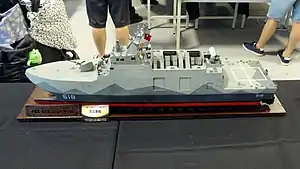 |
Tuo Chiang (PGG-618) | 600 tonnes | on 14 March 2014.[63] |
Minesweepers (9 in service)
| Class | Picture | Type | Ships | Displacement[lower-alpha 1] | Note |
|---|---|---|---|---|---|
| Yung Feng class | _Shipped_at_No.7_East_Pier%252C_Zuoying_Naval_Base_20161112a.jpg.webp) |
ROCS Yung Feng (MHC-1301) ROCS Yung Chia (MHC-1302) ROCS Yung Nien (MHC-1303) ROCS Yung Shun (MHC-1305) |
558.3 tonnes | MWW-50 class, built anew in Germany in early 1990s[64] | |
| Yung Yang class | .jpg.webp) |
ROCS Yung Yang (MSO-1306) ROCS Yung Tzu (MSO-1307) ROCS Yung Ku (MSO-1308) ROCS Yung Ku (MSO-1308) ROCS Yung Teh (MSO-1309) |
735 tonnes | ex-Aggressive class | |
| Yung Ching class | _Shipped_in_Zhongzheng_Naval_Base_20130504a.jpg.webp) |
ROCS Yung Jin (MHC-1310) ROCS Yung An (MHC-1311) |
893 tonnes | ex-Osprey class |
Amphibious ships (9 in service)
| Class | Picture | Type | Ships | Displacement[lower-alpha 1] | Note |
|---|---|---|---|---|---|
| Newport class | 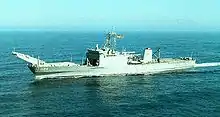 |
tank landing ship |
ROCS Chung Ho (LST-232) ROCS Chung Ping (LST-233) |
8,450 tonnes | ex-USN USS Manitowoc and USS Sumter |
| Chung Hai class | 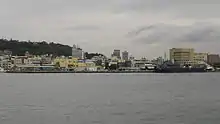 |
tank landing ship |
ROCS Chung Chiang (LST-205) ROCS Chung Shing (LST-208) ROCS Chung Chih (LST-218) ROCS Chung Ming (LST-227) ROCS Chung Ye (LST-231) |
4,080 tonnes | Landing Ship, Tank (LST-1) |
| Kaohsiung class |  |
amphibious command ship |
ROCS Kao Hsiung (LCC-1) | 3,698 tonnes | ex-USS Dukes County, an LST-542-class tank landing ship |
| Hsu Hai class | _transiting_the_Atlantic_Ocean_on_12_August_1988.jpg.webp) |
dock landing ship |
ROCS Hsu Hai (LSD-193) | 13,700 tonnes | ex-USS Pensacola, an Anchorage-class dock landing ship |
Submarines (2 in service)
| Class | Picture | Type | Boats | Displacement[lower-alpha 1] | Note |
|---|---|---|---|---|---|
| Chien Lung class | 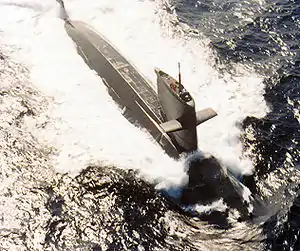 |
diesel-electric submarine |
Hai Lung (Sea Dragon) (SS-793) Hai Hu (Sea Tiger) (SS-794) |
2,660 tonnes | Based on Zwaardvis-class submarine. These are also known by the lead ship's name as the Hai Lung class. |
| Hai Shih class | 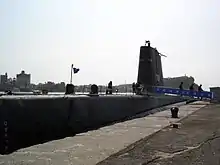 |
diesel-electric submarine |
Hai Shih (Sea Lion) (SS-791) Hai Bao (Sea Leopard) (SS-792) |
2,420 tonnes | Used primarily for Training. World's oldest longest-serving submarines.[65] Has two (one for each submarine) of the three remaining working Arma gyrocompass in the world.[66] |
Auxiliary Ships (10 in service)
| Class | Picture | Type | Boats | Displacement[lower-alpha 1] | Note |
|---|---|---|---|---|---|
| Pan Shi class | _at_Zuoying_Naval_Base_20151024.jpg.webp) |
fast combat support ship |
ROCS Pan Shi (AOE-532) | 20,895 tonnes | AOE-532 |
| Wu Yi class |  |
fast combat support ship |
ROCS Wu Yi (AOE-530) | 17,000 tonnes | AOE-530 |
| Ta Kuan class | 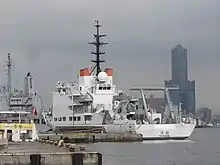 |
ROCS Ta Kuan (AGS-1601) | 3,200 tonnes | oceanographic measurement | |
| Ta Hu class |  |
rescue and salvage ship |
ROCS Ta Hu (ARS-552) ROCS Ta Twen (ARS-556) |
1,975 tonnes | ARS-552 (ex-USS Grapple) |
| Ta Tung class | 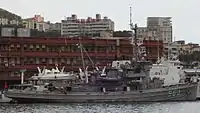 |
ROCS ATF-551 ROCS ATF-553 ROCS ATF-554 ROCS ATF-555 ROCS ATF-563 |
1,680 tonnes | ATF-548 (ex-USS Chickasaw) |
Fixed-wing
| Name | Origin | Type | In service[67] | Notes |
|---|---|---|---|---|
| Lockheed P-3C Orion | Maritime patrol | 12 | Re-built ex-US Navy aircraft and replaced ROCN Grumman S-2 Trackers | |
| Lockheed EP-3E Orion | Signals reconnaissance | 3 | Spare P-3C airframes acquired for future conversion to EP-3E Aries I of II platform | |
| NCSIST Albatross | Reconnaissance UAV | 26 | In service as of 2019[68] |
Helicopters
| Name | Origin | Type | In service[67] | Notes |
|---|---|---|---|---|
| Sikorsky S-70C(M)-1/2 Thunderhawk | Search and rescue / Anti-submarine warfare | 19 | Out of 10+11 ordered | |
| Hughes 500MD/ASW Defender | Anti-submarine warfare | 9 | Out of original 13 ordered |
Surface-to-air missile
| Name | Origin | Type | Notes |
|---|---|---|---|
| Sky Sword I | Short-range | Shipboard deployment with Sea Oryx system. | |
| Sky Sword II | Beyond-visual-range | Unknown number of TC-2N, to be fielded on Tuo Jiang Block II corvettes and retrofitted on the Kang Ding-class frigates.[69] | |
| RIM-66 Standard | Medium-range | 97 RIM-66B Standard-1MR delivered in 1993, 207 RIM-66B Standard-1MR delivered in 1994, 204 RIM-66B Standard-1MR delivered in 2001[70] | |
| RIM-67 Standard | Medium-long range | 148 Standard Missile-2MR delivered in 2005, 144 Standard Missile-2MR delivered in 2008, 16 Standard Missile-2MR ordered in 2017[70] |
Anti-ship missile
| Name | Origin | Type | Notes |
|---|---|---|---|
| AGM-84 Harpoon | Subsonic | (183) AGM-84s – (60) 84Ls[70] | |
| Hsiung Feng II | Subsonic | Unknown, in mass production with secondary ground attack capability[71] | |
| Hsiung Feng III | Supersonic | Unknown, in mass production with secondary ground attack capability |
CIWS
| Name | Origin | Type | Notes |
|---|---|---|---|
| Phalanx CIWS | Gun System | 20mm, 7 Mk-15 delivered in 1989, 6 Mk-15 delivered in 1996, 1 Mk15 delivered in 2014, 13 Mk15 delivered in 2016, 11 Mk15 delivered in 2018[70] |
Torpedoes
| Name | Origin | Type | Notes |
|---|---|---|---|
| Mark 46 torpedo | Lightweight | 100 delivered in 1992, 150 Mk-46 Mod-5 NEARTIP delivered in 1994, 110 Mk-46 Mod-5 NEARTIP delivered in 1998, 90 Mk-46 Mod-5 NEARTIP delivered in 2000, 41 Mk-46 Mod-5 NEARTIP delivered in 2001[70] | |
| Mark 48 torpedo | Heavyweight | 46 ordered in 2018[70] | |
| SUT torpedo | Heavyweight | multirole, 200 delivered in 1998 from Indonesian production line[70] |
Marine Corps
Republic of China Marine Corps : small arms, vehicles, artillery, missiles, and helicopters
Gallery
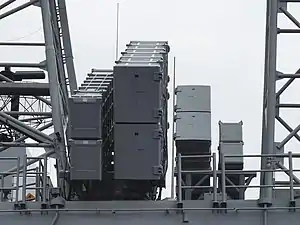 Hsiung Feng II and Hsiung Feng III launchers of ROCN PFG2-1110
Hsiung Feng II and Hsiung Feng III launchers of ROCN PFG2-1110 Sea Oryx Missile Launcher Display at MND Hall
Sea Oryx Missile Launcher Display at MND Hall Covered ROCN Hsiung Feng II & Hsiung Feng III Anti-Ship Missile Launchers Truck Display at Zuoying Naval Base
Covered ROCN Hsiung Feng II & Hsiung Feng III Anti-Ship Missile Launchers Truck Display at Zuoying Naval Base_Helicopter_Deck_Rear_Right_View_20141123.jpg.webp) ROCN Hughes 500 6910 Carried on Lan Yang (FFG-935) Helicopter Deck Rear Right View 20141123
ROCN Hughes 500 6910 Carried on Lan Yang (FFG-935) Helicopter Deck Rear Right View 20141123_2307_Flying_over_Zuoying_Naval_Base_in_Morning_20141123a.jpg.webp) ROCN S-70C(M) 2307 Flying over Zuoying Naval Base in Morning 20141123a
ROCN S-70C(M) 2307 Flying over Zuoying Naval Base in Morning 20141123a_Right_Side_20130504.jpg.webp) Mark 32 Torpedo Tubes Mounted on ROCN Tzu I (PFG-1107)
Mark 32 Torpedo Tubes Mounted on ROCN Tzu I (PFG-1107)_20151024.jpg.webp) No.1 Wan Xiang CAPTOR Mine Display aboard ROCN Ho Zhong (LCU-484)
No.1 Wan Xiang CAPTOR Mine Display aboard ROCN Ho Zhong (LCU-484)_20151024b.jpg.webp) No.2 Wan Xiang Bottom Mine Display aboard ROCN Ho Zhong (LCU-484)
No.2 Wan Xiang Bottom Mine Display aboard ROCN Ho Zhong (LCU-484)_20150316.jpg.webp) Sea Chaparral Launcher Mounted on ROCN Si Ning (PFG-1203)
Sea Chaparral Launcher Mounted on ROCN Si Ning (PFG-1203) T-75S 20mm Cannon Mounted on FACG-77
T-75S 20mm Cannon Mounted on FACG-77_20151024.jpg.webp) Phalanx CIWS and Bofors 40mm L70 Gun aboard on ROCN Di Hua (PFG-1206)
Phalanx CIWS and Bofors 40mm L70 Gun aboard on ROCN Di Hua (PFG-1206) M96 Motorboat
M96 Motorboat The President of Taiwan aboard the Pan Shi
The President of Taiwan aboard the Pan Shi_20150316.jpg.webp) OTO Melara 76mm Gun aboard the Frigate ROCN Si Ning (PFG-1203)
OTO Melara 76mm Gun aboard the Frigate ROCN Si Ning (PFG-1203) ROCN Hsiung Feng II & Hsiung Feng III Anti-Ship Missile Launchers Truck
ROCN Hsiung Feng II & Hsiung Feng III Anti-Ship Missile Launchers Truck_2312_Display_at_Zuoying_Naval_Base_Ground_20151024a.jpg.webp) ROCN S-70C(M) 2312
ROCN S-70C(M) 2312_20151024.jpg.webp) Visitors in Front of ROCN Kao Hsiung (LCC-1)
Visitors in Front of ROCN Kao Hsiung (LCC-1)
Bases



- Tsoying Naval Base – 1st Naval District HQ, largest naval base in Taiwan and naval airfield near Kaohsiung
- Tsoying Naval Airfield and Naval Yard – Tsoying District
- Makung Naval Base (Makung, Pescadores) – 2nd Naval District HQ – home to attack squadrons, training centre and naval yard
- Keelung Naval Base, Keelung – 3rd Naval District HQ, home to northern patrol and transport squadrons and small naval yard
- Suao Naval Base, Su-ao, Yilan – East Coast Command and supports Keelung Naval Base
All remaining bases are small naval stations supporting PCL class small patrol boats and Fast Attack Boat:
Naval Maritime and Surveillance Command
The Naval Maritime and Surveillance Command overseas a network of surveillance radar stations across Taiwan. These include high altitude sites like Hsiaohsuehshan which is located at more than 3,000m above sea level. The high altitude sites pose unique challenges to the Navy as they are often located in inaccessible areas and experience extreme weather including months of snow in the winter.[72]
See also
- List of Republic of China Navy ships
- Ministry of National Defense (Republic of China)
- Republic of China Naval Academy
- Coast Guard Administration (Taiwan)
- Political status of Taiwan
- People's Liberation Army Navy (PLAN) - The naval forces of China.
- Republic of China Navy rank and rating insignia for the rank and rating system of the ROCN (Marine Corps included)
- Maritime industries of Taiwan
Notes
- Displacement when submerged
References
- "Taiwan navy under fire for letting sailors infected with coronavirus into community". South China Morning Post. Retrieved 19 May 2020.
- "First KH-6 squadron entered service as 5th Sea Dragon Squadron". Central News Agency. Archived from the original on 2015-09-23. Retrieved 2010-05-18.
- "First KH-6 squadron entered service". pchome.com.tw. Archived from the original on 2015-04-02. Retrieved 2010-05-18.
- "Red Roof Tiles and White Walls, Hidden Missile Base Next To Hotel". United Daily News. Archived from the original on 2010-12-21. Retrieved 2010-12-23.
- "Navy opens missile base in eastern Taiwan to media". The China Post. Archived from the original on 2010-12-25. Retrieved 2010-12-23.
- "ROC Navy opens missile base in eastern Taiwan to media". China Defense Blog. 2010-12-20. Archived from the original on 2011-04-28. Retrieved 2010-12-23.
- "Navy – Overview". GlobalSecurity.org. Archived from the original on 2006-03-10. Retrieved 2006-03-08.
- "2004 National Defense Report" (PDF). ROC Ministry of National Defense. 2004. Archived from the original (PDF) on March 11, 2006. Retrieved 2006-03-05.
- "Combat Units Under the ROC Navy Fleet HQ". Taiwanmilitary.org. Archived from the original on 2006-07-18. Retrieved 2006-03-08.
- "歷史傳承 (History)". ROC Navy. Retrieved 2006-03-08.
- Lundquist, Edward. "World Navies: Taiwan develops indigenous combat capabilities". www.marinelink.com. Marine Link. Retrieved 19 April 2020.
- Everington, Keoni. "Taiwanese domestic shipbuilder gets bid to build 11 corvettes, 4 minelayers". taiwannews.com. Taiwan News.
- "Taiwan Navy's goodwill mission cut short due to COVID-19". www.taiwannews.com.tw. Taiwan News. Retrieved 12 April 2020.
- Strong, Matthew. "Taiwanese company wins Navy contract for special operations craft". www.taiwannews.com.tw. Taiwan News. Retrieved 15 April 2020.
- "Pentagon could make 2.2 billion dollar arms sales to Taiwan". Yahoo! news. 2007-09-13. Retrieved 2007-09-13.
- "U.S. in deal to refurbish aircraft for Taiwan". Washington Post. 2009-03-13. Retrieved 2007-09-13.
- Jennings, Ralph (2008-08-27). "U.S. to sell anti-ship missiles to Taiwan". Reuters. Archived from the original on 2012-09-07. Retrieved 2017-07-01.
- "USDA New Release" (PDF). dsca.mil. 2010-01-29. Archived from the original (PDF) on 2011-07-21. Retrieved 2010-01-29.
- "USDA New Release" (PDF). dsca.mil. 2010-01-29. Archived from the original (PDF) on 2011-07-21. Retrieved 2010-01-29.
- "armstrade.sipri.org". Archived from the original on 2010-04-14. Retrieved 2010-01-10.
- "Next Year Defense Budget Believed To Be Lowest In 5 Years". United Daily newspaper. 2010-08-31. Archived from the original on 2010-08-31. Retrieved 2010-09-12.
- "US Congress approved sales of mine hunter to Taiwan". United Daily News. 2010-09-30. Archived from the original on 2010-10-03. Retrieved 2010-09-30.
- "6 Navy ships retired". Youth Daily News. 2010-12-29. Archived from the original on 2011-07-28. Retrieved 2010-12-29.
- "All 8 Navy PCL Retired Into History". Military News Agency. 2011-10-31. Archived from the original on 2012-04-25. Retrieved 2011-11-01.
- "2 Lung Jiang Missile Guided Patrol Boats Retired". United Daily News. 2011-12-28. Archived from the original on 2012-07-16. Retrieved 2012-01-03.
- Taiwan receives two US Navy frigates, Mike Yeo, DefenseNews, 2018-06-14
- Lundquist, Edward H. "Interview with Adm. Richard Chen, Republic of China Navy (Ret.)". www.defensemedianetwork.com. Defense Media Network. Retrieved 8 August 2019.
- "Archived copy". Archived from the original on 2019-07-09. Retrieved 2019-07-09.CS1 maint: archived copy as title (link)
- "Archived copy". Archived from the original on 2019-07-09. Retrieved 2019-07-09.CS1 maint: archived copy as title (link)
- "Taiwan will Build its first Indigenous 'Landing Platform Dock' Warship". 2017-04-20.
- Yeo, Mike (2017-08-08). "Taiwan's Navy seeks first indigenous landing platform dock". www.defensenews.com. Defense News. Retrieved 4 August 2019.
- "Taiwanese Navy Plans to Enhance Fleet Air Defense". 2016-06-06.
- "Taiwan and missile defence: Current situation and future prospects". 2018-02-28.
- Mufson, Steven; Kaiser, Robert G. (March 21, 2001). "China Warns U.S. on Warship Sale to Taiwan" – via www.washingtonpost.com.
- "Bush Won't Sell Advanced Radar System to Taiwan". 2001-04-24.
- "Bush rejects sale of Aegis".
- "Alert 5 » Two sets of Mk 41 VLS delivered to Taiwan, will be integrated with indigenous anti-air missiles - Military Aviation News".
- "【獨家】兩套「Mk 41 VLS」運抵高雄 中科院將執行海弓三實彈驗證及整合測試 -- 上報 / 調查".
- "New Missile Launchers Won't Save Taiwan's Navy". 2019-01-28.
- "Taiwan to upgrade Navy ships' self-defense system against air threats | Politics | FOCUS TAIWAN - CNA ENGLISH NEWS".
- Everington, Keoni. "Mysterious radar ship spotted off coast of S. Taiwan". www.taiwannews.com.tw. Taiwan News. Retrieved 2 December 2019.
- http://alert5.com/2020/01/15/taiwan-has-successfully-test-fired-tk-3-from-mk-41-vls/
- https://udn.com/news/story/10930/4288525
- "US to Help Taiwan Build Attack Submarines". The Diplomat. 2014-04-15. Archived from the original on 2014-10-06. Retrieved 2014-10-30.
- Price, Greg (8 April 2018). "Trump Testing China? President Gives Taiwan License to Buy American Submarines". Newsweek. Archived from the original on 8 April 2018. Retrieved 8 April 2018.
- "6廠商爭取潛艦國造細部設計 傳日本、印度團隊赫然在列 - 政治 - 自由時報電子報". news.ltn.com.tw. 2018-07-10. Archived from the original on 2019-01-01. Retrieved 2018-12-31.
- "Taiwan to build eight submarines under indigenous shipbuilding project". Reuters. 5 April 2017. Archived from the original on 21 May 2017. Retrieved 1 July 2017 – via www.reuters.com.
- Diplomat, Franz-Stefan Gady, The. "India, Japan to Submit Design Proposals for Taiwan's New Indigenous Submarine". The Diplomat. Archived from the original on 2018-07-12. Retrieved 2018-07-12.
- "Model of Taiwan's domestically-made submarine".
- https://www.scmp.com/news/china/military/article/3009573/taiwan-offers-glimpse-home-built-submarine-designed-deter
- "Taiwan Unveils Model of Indigenously-Designed Diesel-Electric Attack Submarine".
- "Hidden Dragon / Indigenous Defense Submarine".
- Jensen, Sally. "Travel to Hong Kong or Macau restricted for Taiwan submarine personnel". www.taiwannews.com.tw. Taiwan News. Retrieved 28 October 2019.
- Deaeth, Duncan. "Heping Island in N. Taiwan likely site for indigenous submarine project". www.taiwannews.com.tw. Taiwan News. Retrieved 28 October 2019.
- https://www.scmp.com/news/china/military/article/3111780/taiwan-starts-building-its-own-submarines-despite-questions
- https://www.thedrive.com/the-war-zone/37840/taiwan-is-finally-set-to-build-the-new-diesel-electric-submarines-it-desperately-needs
- "Taiwan confirms the commissioning of three Tuo Chiang-class Corvettes".
- "Taiwan Wants to Speed up Construction of Its New Missile-Toting Stealthy Catamarans".
- "影/蔡總統主持 3艘沱江級軍艦與4艘布雷艇建造開工".
- "US plans to sell warships to Taiwan". Yahoo News. Archived from the original on 2015-12-19. Retrieved 2015-12-17.
- Pike, John. "Taiwan to buy Perry-class frigates from U.S." globalsecurity.org. Archived from the original on 5 May 2016. Retrieved 4 July 2016.
- "Taiwan's Force Modernization: The American Side". Defense Industry Daily. 21 July 2015. Archived from the original on 20 November 2016. Retrieved 30 January 2016.
- Rahmat, Ridzwan (13 March 2014). "Taiwan launches first 'carrier killer' stealth missile corvette". IHS Jane's 360. Archived from the original on 2014-12-18. Retrieved 2019-07-16.
- "World Navies Today: Taiwan (Republic of China)".
- "Taiwan public gets glimpse of world's lon".
- "Museum documents an operating US, WW II built submarine in Taiwan".
- "Naval Aviation Command". Globalsecurity.org. Archived from the original on 2007-07-12. Retrieved 2007-07-16.
- and Evelyn Kao, Wang Cheng-chung. "Albatross drone makes first fly-over demonstration in Pingtung". focustaiwan.tw. Focus Taiwan. Retrieved 17 January 2020.
- Lundquist, Edward H. "Interview with Adm. Richard Chen, Republic of China Navy (Ret.)". www.defensemedianetwork.com. Defense Media Network. Retrieved 2 August 2019.
- "TRADE REGISTERS". sipri.org. Stockholm International Peace Research Institute. Retrieved 19 April 2019.
- "Hsiung Feng II". csis.org. Center for Strategic and International Studies. Archived from the original on 2 April 2019. Retrieved 2 April 2019.
- Chin, Jonathan. "Navy radar station guards west coast from mountain top". www.taipeitimes.com. Taipei Times. Retrieved 1 December 2020.
